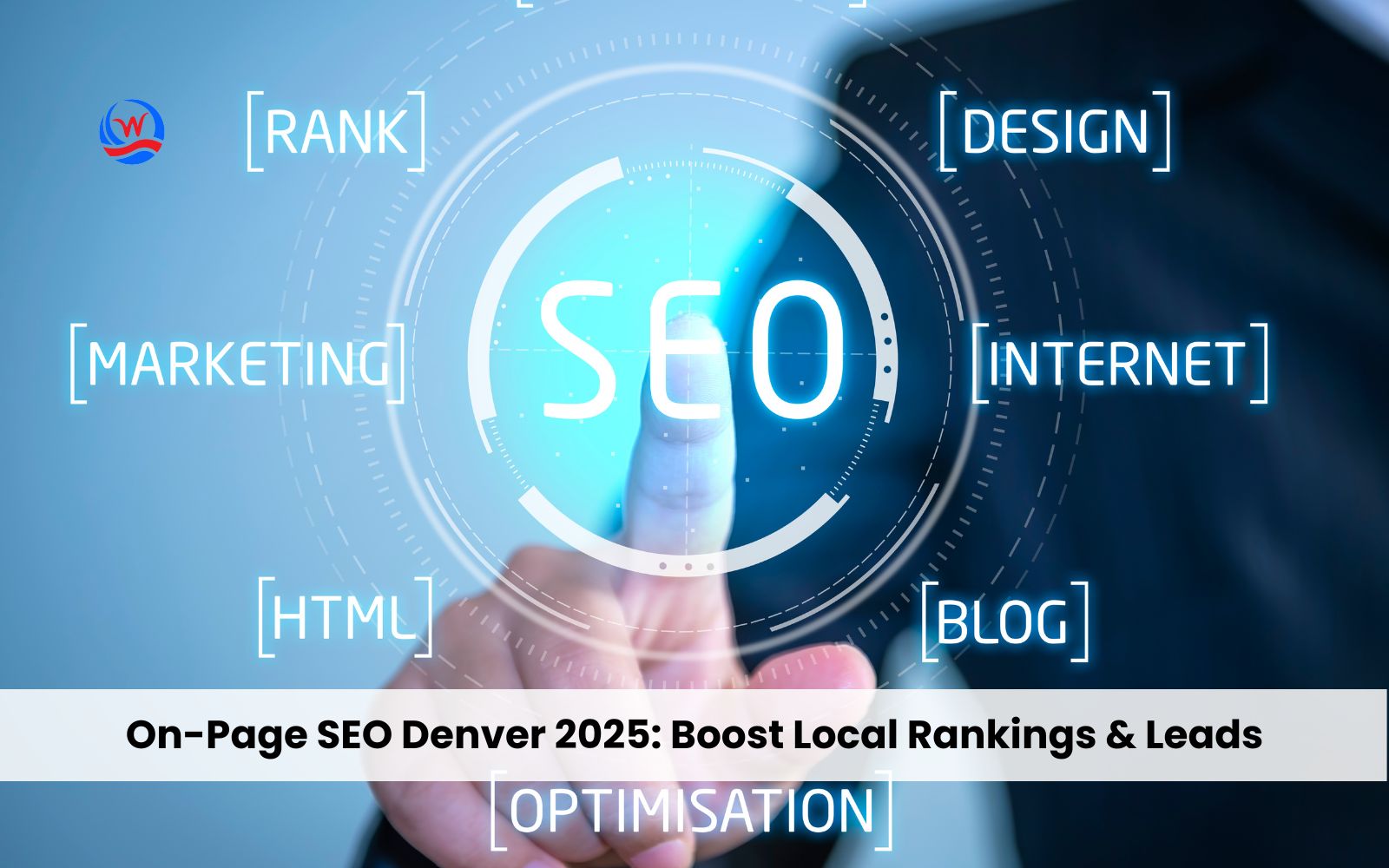On page SEO Denver involves optimizing each page of your website to climb higher in search engine rankings, generate local leads, and build your brand’s digital visibility. This means refining your content, metadata, site structure, and user experience for both search engines and real Denver customers.
Local optimization bridges the gap between your online presence and your Denver audience, turning searches into business growth.
In this comprehensive guide, you’ll learn:
- What on-page SEO is and why it’s especially important for businesses
- Essential on-page optimization components with examples
- Local keyword research strategies for the market
- Content creation techniques that resonate with audiences
- Common mistakes to avoid and how to measure your success
What Is On-Page SEO?
On-page SEO – sometimes called on page search engine optimization – is the process of optimizing the visible parts of your website: content, HTML elements, structure, and usability.
Unlike off-page SEO (like backlinks) or technical SEO (site speed, hosting), onpage SEO focuses on everything you control directly on your web pages.
The core goal? Help both search engines and human users immediately understand your site, what you offer, and that you’re relevant in the Denver market.
In the fiercely competitive Denver marketplace, every bit of on page optimization counts – especially when your competitors may be targeting the same neighborhoods or customers. Done right, onpage SEO makes your site a magnet for Denver-local searchers ready to buy.

Core Components of Effective On-Page SEO
#1: Title Tags and Meta Descriptions
Clear, keyword-rich title tags are crucial for Denver businesses looking to stand out in search engine results pages (SERPs). Your title tag should include your primary keyword (like “Denver plumbing services” or “Denver tax attorney”) while remaining compelling and under 60 characters.
- Bad Example: “Services – Denver Company”
- Good Example: “24/7 Emergency Plumbing Services in Denver | Fast, Reliable Fixes”
Meta descriptions, while not direct ranking factors, significantly impact click-through rates. Include location modifiers and a clear value proposition.
- Bad Example: “We provide services in Denver and surrounding areas.”
- Good Example: “Expert Denver plumbers offering same-day service throughout the metro area. Family-owned with 20+ years of experience serving Colorado homes.”
#2: Headers (H1, H2, H3) Structure
Well-organized headers improve both readability and SEO value. They help search engines understand your content structure and highlight important topics. For Denver businesses, localize your headers to boost relevance.
Tip: Instead of generic headers like “Our Services,” use localized versions like “Top-Rated HVAC Services in Denver” or “Denver’s Most Trusted Home Inspection Experts.”
A strong H1 should include your primary keyword and clearly describe the page content, while H2s and H3s can incorporate secondary keywords and neighborhood-specific terms like “Capitol Hill,” “Highland,” or “Denver Tech Center.”
#3: URL Optimization
User-friendly URLs that include keywords perform better in search results. Keep your URLs short, descriptive, and include relevant keywords when appropriate.
- Bad Example: www.example.com/page22?id=67
- Good Example: www.example.com/denver-seo-services
For location pages, include the neighborhood or area name: www.example.com/denver-highlands-roof-repair
#4: Content Quality and Keyword Optimization
High-quality, localized content is perhaps the most important on-page SEO factor. Your content should:
- Answer questions Denver residents are asking
- Include natural mentions of local landmarks, neighborhoods, and events
- Provide in-depth information (Google favors comprehensive content)
- Use keywords strategically without stuffing
For example, a Denver landscaping company might create content about “drought-resistant plants for Denver gardens” or “lawn care tips for Colorado’s dry climate.” These topics address specific local needs while naturally incorporating relevant keywords.
#5: Image SEO
Don’t overlook your images when optimizing for Denver search results. Proper image SEO includes:
- Descriptive file names (denver-skyline-sunset.jpg vs. IMG_12345.jpg)
- Alt text that describes the image and includes location when relevant
- Compressed file sizes for faster loading
- Location-specific images when possible (Denver skyline, local landmarks, neighborhood features)

#6: Internal Linking
A strategic internal linking structure helps search engines understand your site hierarchy and spreads link equity throughout your site. For Denver businesses, this means:
- Linking to your Denver service pages from blog posts
- Creating natural links between neighborhood-specific service pages
- Using descriptive anchor text that includes location terms when appropriate
For example, a Denver real estate agency might link from a blog post about “Denver housing market trends” to their “Denver home buying services” page using descriptive anchor text.
#7: Mobile-Friendliness
With over 60% of searches now performed on mobile devices, having a mobile-friendly website isn’t optional – especially in Denver’s tech-savvy market where consumers frequently search for local businesses on the go.
Google uses mobile-first indexing, meaning it primarily uses the mobile version of your site for ranking and indexing.
Ensure your site looks great and functions well on all device sizes. Test your site’s mobile-friendliness using Google’s Mobile-Friendly Test tool.
#8: Page Speed and Core Web Vitals
Site speed is critical for both user experience and SEO performance. Denver users, like most online consumers, are impatient – more than 50% will abandon a site that takes more than 3 seconds to load. Google’s Core Web Vitals measure loading performance, interactivity, and visual stability.
To improve page speed:
- Compress images
- Minimize CSS and JavaScript
- Use browser caching
- Consider a content delivery network (CDN)
- Implement AMP (Accelerated Mobile Pages) when appropriate
Local Keyword Research and Implementation for Denver
Finding the Right Keywords
Effective on-page SEO starts with thorough keyword research tailored to the Denver market. Here’s how to identify the most valuable keywords:
- Use specialized tools: Google Keyword Planner, SEMrush, Ahrefs, and Moz Pro can help identify Denver-specific search terms and their monthly search volumes.
- Analyze competition: Examine what keywords your successful Denver competitors are ranking for and identify gaps in their strategies.
- Consider search intent: Different keywords indicate different user intentions (informational, navigational, transactional). A search for “best Denver accountants” suggests a different intent than “Denver tax preparation services near me.”
- Focus on hyperlocal terms: Beyond “Denver,” include neighborhood-specific keywords like “Capitol Hill,” “Cherry Creek,” “LoDo,” or “Highlands” when relevant to your service areas.
Strategic Keyword Placement
Once you’ve identified your target keywords, strategic placement is crucial:
- Title tags: Include your primary keyword near the beginning
- Headers: Use keywords in H1, H2, and H3 tags where natural
- First paragraph: Mention your primary keyword early in your content
- Throughout content: Incorporate keywords naturally at a reasonable density
- Image alt text: Include keywords when describing images
- Meta description: While not a direct ranking factor, keywords in meta descriptions improve click-through rates
- URL: Include simplified versions of your keywords
Remember to incorporate Denver-specific references – mentioning local landmarks like Red Rocks, the 16th Street Mall, or Union Station can add context and relevance for both users and search engines.
Long-Tail Keywords and Their Value for SMBs
Long-tail keywords – more specific, typically longer phrases – often have lower search volume but higher conversion rates. For Denver small businesses, these can be goldmines because:
- They have less competition
- They capture users with specific intent
- They often indicate users who are further along in the buying journey
Examples of valuable Denver long-tail keywords include:
- “emergency water damage restoration Denver Tech Center”
- “best gluten-free Italian restaurant downtown Denver”
- “affordable family photographer Washington Park Denver”
- “Denver eco-friendly house cleaning services Stapleton”

Semantic SEO and Entity Optimization for Denver Businesses
Moving Beyond Keywords to Topics and Entities
Modern SEO is increasingly focused on semantic understanding rather than exact keyword matching. Google’s algorithms now recognize entities (people, places, things, concepts) and understand the relationships between them.
For Denver businesses, this means:
- Develop comprehensive topic clusters: Create content around related topics that establish your expertise in specific areas relevant to Denver customers.
- Use natural language and synonyms: Rather than repeating the exact same keyword, use variations and related terms. For example, content about “Denver mountain biking” might naturally include terms like “Front Range trails,” “Colorado outdoor recreation,” or “Rocky Mountain cycling.”
- Build topical authority: Become the go-to resource for specific topics relevant to your Denver audience. A Denver real estate agency might develop in-depth content about each neighborhood they serve.
Local Schema Markup
Schema markup is a type of structured data that helps search engines understand your content better. For Denver businesses, local business schema is particularly valuable:
- LocalBusiness schema: Include your Denver business name, address, phone number, hours, and service areas.
- Review schema: Highlight customer ratings and reviews.
- Service schema: Detail specific services offered in Denver.
- FAQPage schema: Markup frequently asked questions about your Denver services.
Proper schema implementation can help your business appear in rich snippets, knowledge panels, and the local pack – all valuable real estate in Denver search results.
Content Creation Strategies for On-Page SEO
Creating Location-Specific Landing Pages
For businesses serving multiple Denver neighborhoods or suburbs, creating location-specific landing pages can significantly boost local relevance:
- Neighborhood-specific content: Develop unique, valuable content for each neighborhood you serve (not just duplicate pages with changed location names).
- Address local pain points: Discuss challenges specific to different Denver areas (e.g., weatherproofing concerns in mountain-adjacent neighborhoods vs. urban considerations in downtown).
- Include area-specific testimonials: Feature reviews from customers in each neighborhood.
- Mention local landmarks and features: Reference neighborhood-specific details that demonstrate local knowledge.
Avoiding duplicate content: Ensure each neighborhood page contains substantial unique content – at least 30-50% should be different from other location pages.
Blog Content Optimization for Audiences
A blog is one of the most powerful tools for on-page SEO. For Denver businesses, consider these strategies:
- Local event tie-ins: Create content around Denver events like the Great American Beer Festival, Denver Arts Week, or neighborhood farmers markets.
- Seasonal content: Address seasonal concerns specific to Denver’s climate (preparing gardens for Colorado winters, summer lawn care during drought conditions, etc.)
- Local business partnerships: Feature interviews or collaborations with complementary Denver businesses.
- Community spotlights: Highlight community initiatives, neighborhood developments, or local causes.
Each blog post should be optimized with appropriate keywords, headers, meta descriptions, and internal links to your service pages.
Visual Content Optimization
Visual content can significantly enhance your on-page SEO efforts:
- Local imagery: Use photos of your business in Denver settings, local landmarks, or recognizable Denver backdrops.
- Alt text optimization: Include descriptive alt text with location references for all images.
- Video content: Create and optimize videos about Denver-specific topics or showcasing your Denver services.
- Infographics: Develop shareable visual content relevant to Denver audiences (e.g., “Denver Housing Market Trends” or “Top Denver Home Improvement ROI”).
Internal Linking and User Experience Optimization
Strategic Internal Linking
Internal linking is crucial for site structure and user experience:
- Service area connections: Link between neighborhood-specific pages where relevant.
- Topic clusters: Group related content and link between pages (e.g., Denver roof repair, Denver hail damage assessment, Denver roof insurance claims).
- Descriptive anchor text: Use specific, keyword-rich anchor text like “Denver kitchen remodeling experts” rather than generic “click here” links.
- Breadcrumb navigation: Implement breadcrumbs to help users and search engines understand site hierarchy.
User Experience Factors in On-Page SEO
Google increasingly considers user experience signals when ranking sites:
- Mobile optimization: Ensure your site works flawlessly on all devices, especially since many Denver customers will search for local businesses on mobile.
- Page speed: Optimize loading times to prevent user abandonment.
- Easy navigation: Create intuitive menus and site structures.
- Clear calls to action: Make it obvious how Denver customers can contact you, schedule appointments, or make purchases.
- Local trust signals: Display Denver-specific credentials, associations, and testimonials prominently.

Analytics and Reporting for Denver On-Page SEO
Key Metrics to Track
To measure your on-page SEO success, focus on these metrics:
- Local search rankings: Track your positions for Denver-specific keywords.
- Geographic traffic: Monitor visits from Denver and surrounding areas.
- Conversion rates: Measure how often visitors complete desired actions (calls, form submissions, purchases).
- Bounce rates: Track how many visitors leave without engaging.
- Time on site: Measure engagement from local visitors.
Tools for Monitoring On-Page SEO Performance
Several tools can help track your Denver SEO performance:
- Google Search Console: See how your site appears in search, identify issues, and understand what searches bring visitors to your site.
- Google Analytics: Track visitor behavior, geographic data, and conversion metrics.
- Local rank tracking tools: Use tools like BrightLocal or Moz Local to monitor Denver-specific rankings.
- Heatmapping software: Understand how visitors interact with your pages.
Common On-Page SEO Mistakes to Avoid (Especially for Denver Sites)
- Keyword stuffing without local relevance (repeating “Denver” unnaturally)
- Creating duplicate content across city pages with minimal changes
- Neglecting mobile optimization (critical for local searches)
- Ignoring Denver-specific search intent
- Using weak or generic internal links
- Overlooking image optimization opportunities
- Ignoring local schema markup
- Creating thin content that doesn’t address local needs
- Using misleading meta descriptions
- Neglecting page speed optimization
How The Ocean Wide Can Help Your Business
At The Ocean Wide, we bring proven expertise in on-page SEO for Denver businesses. Our local-focused services include:
- Full on-page SEO audits tailored for Denver market needs
- Denver SEO content optimization and ongoing improvements
- Technical and visual optimization for your service, product, and landing pages
- Local schema, Google Business Profile guidance, and Denver-specific keyword strategies
Want to see real Denver SEO ranking improvements?
Contact The Ocean Wide at [email protected] or call 720-334-0899 for your free on-page SEO consultation today!
Conclusion
On-page SEO isn’t just a checklist – it’s your ticket to standing out in the marketplace and reaching ready-to-buy local customers. With the right strategies, you can enjoy higher rankings, more website traffic, and a noticeable boost in leads from your target Denver audience.
Frequently Asked Questions (FAQs)
How long does it take to see results from on-page SEO in Denver?
Most Denver businesses begin seeing improvements within 2-3 months, with significant results typically appearing around 4-6 months. However, this timeline varies based on your current site condition, competition level, and industry. Early indicators of success include improved rankings for less competitive terms and increased site traffic.
Should I focus on Denver or Colorado keywords for my on-page SEO?
Both have value, but your approach should depend on your service area. For businesses serving primarily Denver customers, prioritize city-specific keywords. For those serving the broader region, create a hierarchical approach with dedicated pages for different geographic areas, with Denver-specific content for your Denver market.
How often should I update my on-page SEO elements for my Denver business?
Conduct a comprehensive SEO audit quarterly, with ongoing content updates monthly. Denver businesses should especially refresh content before major seasonal changes (winter, summer) as search patterns shift. Regular updates signal freshness to search engines and keep your content relevant to changing Denver market conditions.
Can I implement on-page SEO myself, or should I hire a Denver SEO professional?
While basic on-page SEO elements can be implemented by business owners with some digital marketing knowledge, professional assistance typically yields better results, especially in competitive Denver markets. If you choose the DIY route, invest in education through resources like Moz, SEMrush, or Ahrefs. When hiring a Denver SEO partner, look for proven local experience and case studies specific to your industry.
How does on-page SEO work with Google Business Profile for Denver businesses?
Your website’s on-page SEO and Google Business Profile should work in tandem with consistent NAP (name, address, phone) information across both platforms. Website content should expand on services, products, and areas mentioned in your GBP. Strong on-page SEO improves your website authority, which indirectly supports your local pack rankings, while GBP optimization directly impacts local pack presence.



